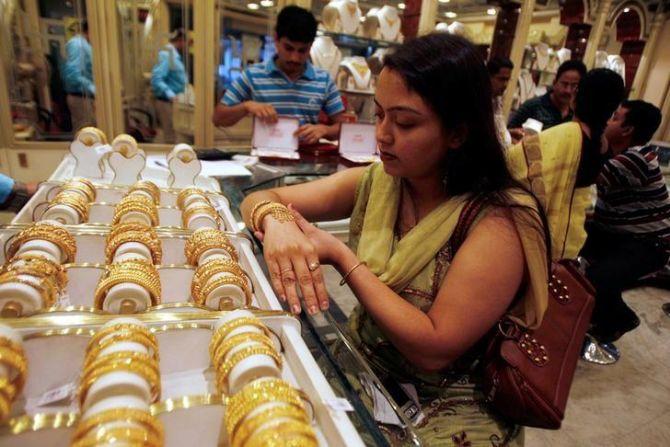Now, in many cases, they give no old jewellery but the bills they get show gold as provided by them, the jeweller’s making charge and the GST on that.

With the festive season, gold demand is slowly returning. However, customers now prefer barter deals, to avoid giving their identity details for jewellery buying above Rs 50,000 - required since last month under the Prevention of Money Laundering Act (PMLA) provisions.
Some profit booking in a sliding stock market and more income with government employees due to implementation of the pay commission report have ensured some money for gold jewellery, traditionally bought during the Dussehra and Diwali festivals.
However, while accepting the three per cent Goods and Services Tax (GST), customers aren’t willing to comply with the PMLA rule.
Says Ajay Kedia, director, Kedia Commodities: “Jewellers are selling by showing gold as provided by customers for conversion to jewellery. As a result, buyers are able to circumvent the identification rule. Jewellers are happy as by this method, buyer and wedding jewellery enquiries are alive after the business drop due to GST and implementation of the new KYC (Know Your Customer) and PMLA norms.”
Usually, customers exchanged old jewellery for new and settled the difference.
Now, in many cases, they give no old jewellery but the bills they get show gold as provided by them, the jeweller’s making charge and the GST on that.
In such cases, they have to pay less than Rs 50,000 as making charge and avoid complying with the PMLA/KYC rules.
Jewellers have to manage to show the gold as received from customers, a book entry. In doing so, they charge a premium of around two per cent, doing so in cash.
Titan Company, a leading entity, said in a quarterly update for end-September that it had got through the GST disruption but “the jewellery division was subject to yet another regulatory impact in this quarter, with stores required to collect KYC details from customers for transaction above Rs 50,000 and file returns.
Industry representatives have been representing to the government to relax the limit”. Titan considers Rs 50,000 too low for a high value item like gold jewellery.
It notes the provision of providing PAN (the income tax number) for a purchase of Rs 2 lakh or above was being implemented, with all cash deals above this level being banned.
Surendra Mehta, secretary, Indian Bullion and Jewellers Association, said: “Customers are not willing to part with their KYC details. The government has not done enough publicity regarding PMLA provisions’ applicability for customers, as they did in the case of GST.”
Photograph: Rupak De Chowdhuri/Reuters











